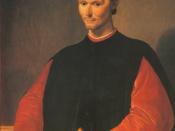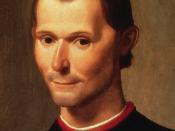Chronological Issues And Their Philosophical Solutions
Throughout history, there have been many philosophers who have looked at their environments, all seeking the remedies to the social, economic, and political problems faced by its people. Among them are Niccolo Machiavelli, John Locke, and Karl Marx and Fredrick Engels. Each of the authors' ideas and writings are influenced by, and reflect, the problems that they faced during their time. This difference in the temporal environment created oppositions between the philosophers' views. This essay will explore the writings and environments of each aforementioned philosopher and offer an analysis of how each would criticize the others' ideas.
Machiavelli was born in Florence, Italy during the 15th century, a time in which the country was in political and social disorder. Italy was separated into four main states, and each of these was frequently at the mercy of the more powerful foreign governments of Europe.
Throughout his career Machiavelli sought to set up a state with the ability of resisting foreign attack. When the Medici family regained power in 1512 with the help of Spanish troop, Machiavelli was expelled from public life. For the next 10 years he dedicated himself to writing history and political philosophy. Machiavelli's greatest work is The Prince, written in 1513 and published after his death in 1532.
In his book, The Prince, Machiavelli describes the process by which a prince can obtain and uphold political power. A prince should use any means of convenience, including deception, to retain total power and control of his country. Machiavelli argued that it is primarily the character and skill of the prince that determines the success of his reign. Thus, a prince must possess and exhibit the following five qualities: forgiveness, integrity, humaneness, morality, and spirituality. To free national countries from the influence of...


